Aikomi Ltd. (hereinafter referred to as Aikomi) is the provider of "Aikomi Care", a tool that supports communication between people with dementia, their families, and caregivers.
Based on the principle of "living with dementia", the company's mission is to improve the quality of life (QOL) of people affected by dementia. Currently drugs are the main treatment for behavioral and psychological symptoms of dementia (BPSD)*, in contrast Aikomi is providing multiple types of "non-drug therapy" using digital tools. By reducing BPSD, Aikomi aims to contribute to a society where people with dementia are empowered to lead meaningful and engaged lives with the people around them.
*Behavioral and psychological symptoms of dementia (BPSD) describes a heterogenous group of neuropsychiatric disturbances associated with dementia. Recently the term of BPSD is becoming replaced by “responsive behaviors” or “challenging behaviors” especially overseas.
Aikomi was founded in 2018 as a spin-out company from a Takeda Pharmaceutical Company Limited digital health technology project. In 2019, Aikomi signed a partnership with Sumitomo Dainippon Pharma Co., Ltd. (hereinafter referred to as Sumitomo Dainippon Pharma) to conduct joint research on medical devices for treatment of BPSD. In August 2020, a further agreement was reached with Sompo Japan Insurance Inc. (hereinafter referred to as Sompo Japan Insurance) to from a 3 company partnership. This aims to establish a new standard of care for BPSD by utilizing Sumitomo Dainippon Pharma's expertise in neuropsychiatric drugs, Aikomi's technology platform, and Sompo Group's frontline experience in the nursing care business.
Here, we introduce Aikomi Care, which aims to enable a "person-centered care" approach to supporting people with dementia to live according to their individuality, personality and life experiences.
Approach to BPSD care in dementia care
According to data from the Cabinet Office, the social cost of dementia is projected to exceed 21 trillion yen in 20301). In addition, it is estimated that there will be approximately 7 million people with dementia in 2025, with approximately 1 in 5 elderly people aged 65 and over being affected2).
Currently, management of BPSD is conducted in various ways, mainly through long term nursing care. However, nursing care for people with dementia requires high levels of expertise and needs to be conducted on an individual basis. Due to the declining birthrate and aging population, unless dementia care that maintains the QOL of people with dementia can be personalized and automated, current levels of medical care in Japan cannot be sustained. Therefore, this is an area where there are considerable opportunities for improvement through innovation.
Mental resilience is also an important aspect of recovery from neuropsychiatric illness. Our aim is to provide social care that encourages good mutual relationships with family and care workers so that people can live well for as long as possible after developing dementia.
Dementia is not just a problem for the person with dementia, and it is important for sufferers to connect with their families and caregivers through "dialogue and engagement" to build a relationship of trust. This may lead to better QOL not only for people with dementia but also their families and nursing care staff.
Sumitomo Dainippon Pharma and Aikomi wish to help people with dementia live their lives to the full, in their own way and with vitality. In other words, we want to ensure that people with dementia live an autonomous senior life and we are working to develop a new businesses in order to achieve this vision.
Three challenges in dementia
Three Problems with Dementia

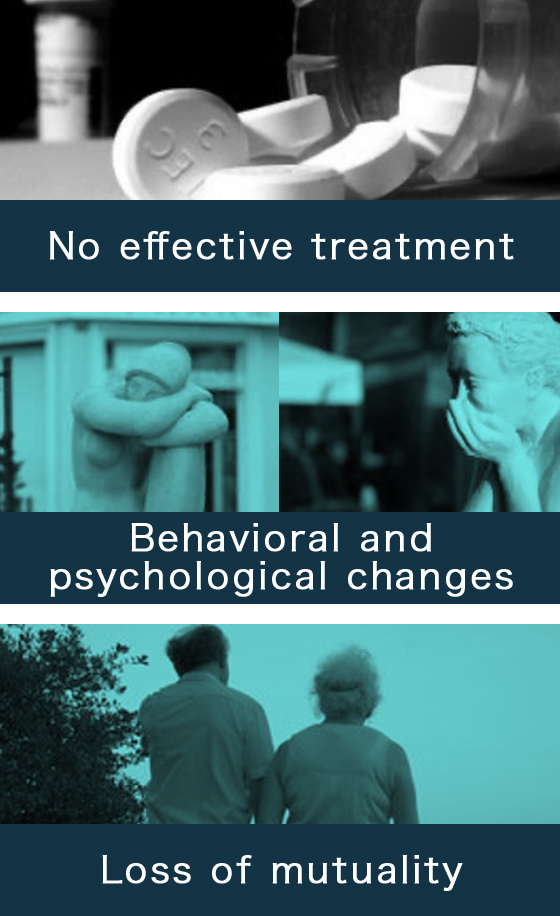
Dementia presents three major challenges: first, there are no effective treatments; second, BPSD occurs in almost all people with dementia and third, dementia affects the mutuality of relationships between the sufferers and the people who are close to them.
The main symptoms of dementia are broadly classified as "core symptoms" and "BPSD." Core symptoms are memory or cognitive impairments that originate in the brain and include symptoms such as "not being able to remember new things" or "not knowing the date or place" On the other hand, BPSD refers to a range of neuropsychiatric disturbances that arise due to environmental, physical, and psychological factors in addition to the core symptoms. BPSD includes psychological and behavioral changes such as agitation, apathy, and anxiety.
Until now, drug therapy has been the main treatment for core symptoms of dementia. In contrast, for BPSD, non-drug therapy is recommended in treatment guidelines. This is due to problems that cannot be solved by drug treatment alone, for example sudden agitation and behavioral disturbances that lead to deterioration in relationships with loved ones, loss of mutuality and worsening of core symptoms and BPSD.
While non-drug therapies such as reminiscence therapy, music therapy, and exercise therapy have been used in the treatment of BPSD, they lack sufficient evidence or systematic protocols and are dependent on many personal factors.
Person-centered care
As a company that provides Aikomi Care, a tool to promote communication and engagement between people with dementia, Aikomi aims to overcome the problem of inconsistent efficacy of non-drug therapy, which often depends on the skills of caregivers, by providing individualized programs tailored to life experiences, abilities, and preferences of each person with dementia.
Aikomi Care is also expected to help in the implementation of person-centered care, which supports people with dementia to live according to their own perspective. Person-centered care respects the humanity and individuality of people with dementia and considers maintaining good relationships between people with dementia, their families, and medical and nursing care staff as essential for the treatment of dementia. Aikomi CEO Nick Hird says that this concept was the first priority when developing Aikomi Care.
"Nursing and communication are fundamentally human activities that should not just be left to robots and technology. Data show that the BPSD of people with dementia has worsened considerably since the start of the coronavirus pandemic3), which shows that communication with others is critical for people with dementia. Family members can also gain positive and meaningful experiences from caring for their loved ones, much in the same way as they do when raising their children. Therefore, Aikomi Care is dedicated to being a communication support tool." (Nick Hird, CEO of Aikomi).
Features of the "Aikomi Care" Solution to be Provided
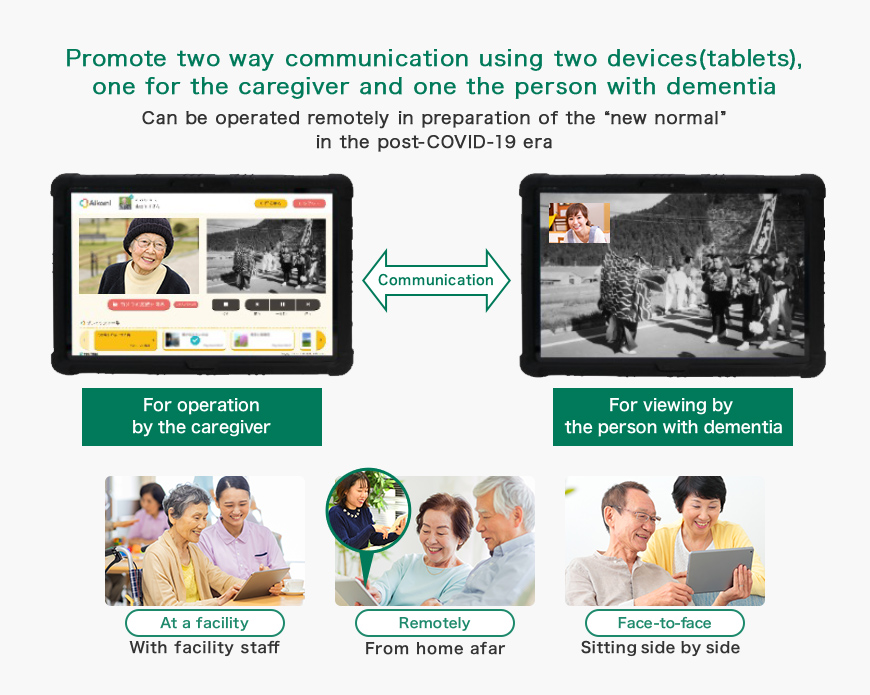
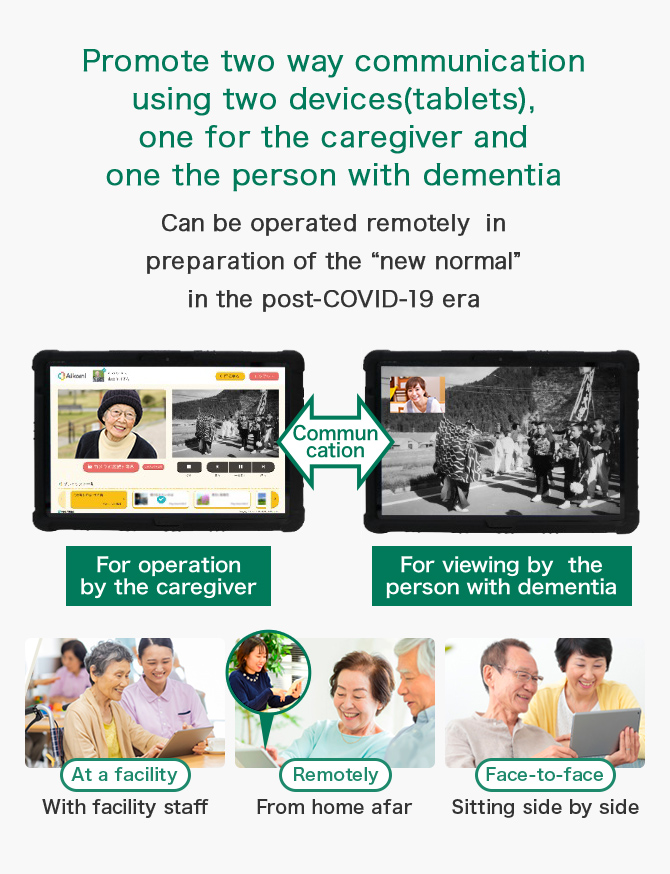
The Life Story so far becomes care for the future
"Aikomi Care" Service Content and Cycle
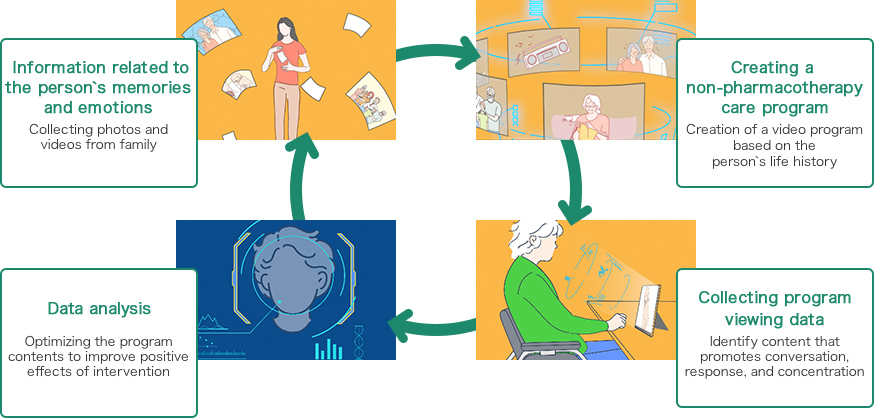
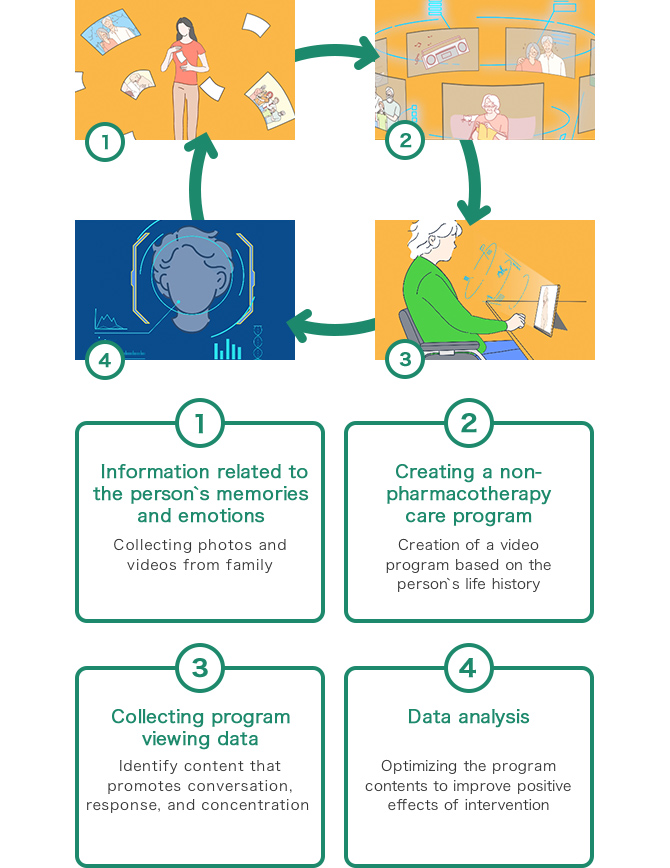
The marketing of Aikomi Care is primarily focused on developing business for consumers and long-term nursing care. This service enables people with dementia to enjoy talking while watching a personalized stimulation program for approximately 30 minutes once a week. Based on interviews with family members, the stimulation programs are prepared using images, videos, and sound sources to provide sensory stimulation to the person with dementia, including digitized old family photographs. The non-drug therapy program is tailored to each individual's preferences and life story and can be conveniently shown on a tablet device by families and caregivers.
Caregivers communicate with people with dementia while showing them the stimulation programs and many caregivers who have used Aikomi Care have commented that their communication and relationship with the person with dementia has improved. Aikomi Care aims not only to treat BPSD, but also to improve the QOL of all people involved in dementia by providing personally meaningful stimulation programs to people with dementia to enhance communication and emotional connection with their family members and caregivers.
Aikomi Care is a psychosocial interventions that stimulates the long-term memory and emotions of people with dementia by using individual life stories and past life experiences through personalized stimulation programs. In addition, in some cases continued use of Aikomi Care may improve emotional stability and restore motivation of people with dementia. It is hoped that people with dementia who appear apathetic and show limited facial expression or active speech will become more emotional and able to speak spontaneously after watching the programs.
This is how Aikomi Care works in practice
- 1. A personal profile based is created by collecting as much information about the life story, interests, and hobbies of the person with dementia from their family members.
- 2. Sensory stimulating contents related to the profile, such as photographs, videos, and sound sources are selected and compiled into a stimulation program.
- 3. The program is shown to the person with dementia and their response behavior while watching the program, such as speaking, pointing a finger, moving, and singing is recorded.
- 4. Data on stimulation program contents and response behavior are analyzed to find correlations and optimize the program to improve communication, concentration, and meaningful engagement.
Since this program can be operated remotely as well as in person, family members do not have to be physically with the person with dementia to use Aikomi. In addition, we plan to automate the program generation process using AI technology in the future.
A daughter of a person with dementia who used Aikomi Care remotely to communicate with her mother for approximately 30 minutes a week for a year provided the following comments about her experience:
"I feel that my mother is gradually understanding things that she did not understand at first, after watching Aikomi Care several times. When she saw photos of my grandfather, she initially said, 'Who is this person?' but gradually she came to understand and now says, 'I really enjoyed it.' Using Aikomi, I can care for my mother remotely, and I feel that I have a stronger connection with her caregivers. Above all, it makes me happy to feel that I am being dutiful to my parent."
Aiming to establish a new standard of care in dementia
3-Company Alliance, Including Sompo Japan Group, which Operates a Nursing Care Business*
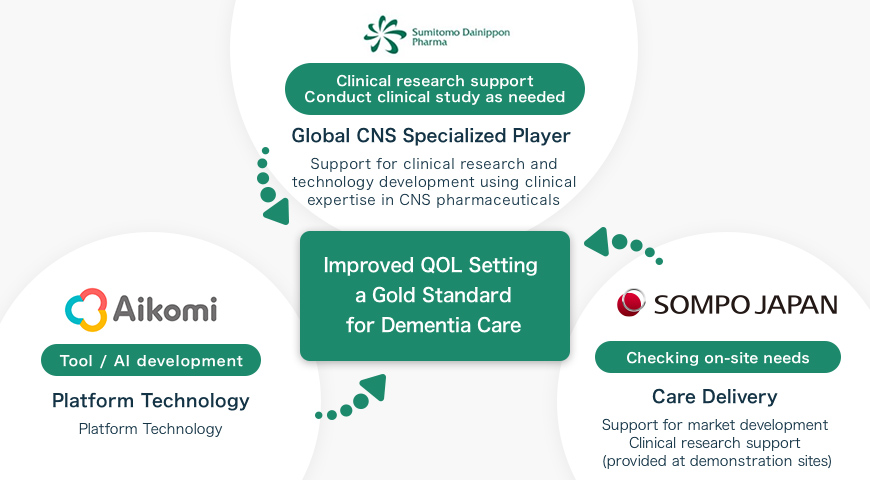
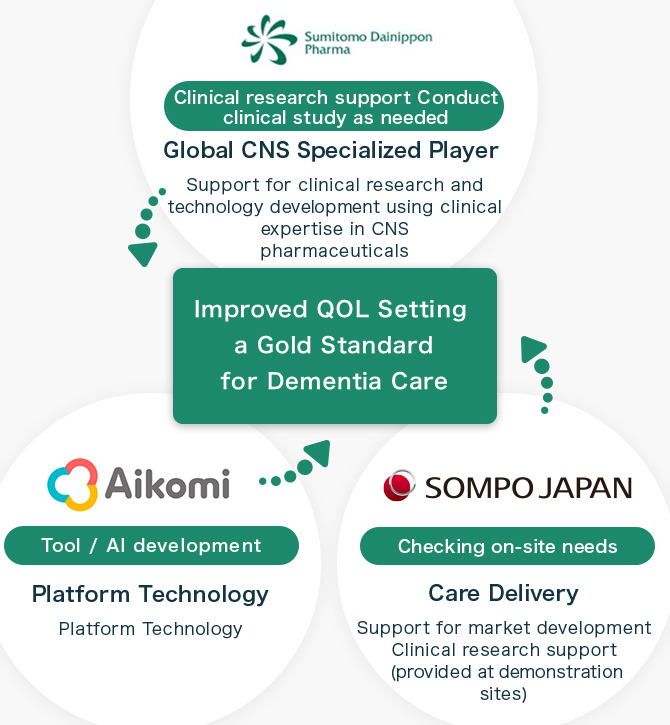
As mentioned above, BPSD care requires non-drug therapy to be delivered in a nursing care setting which involves not only people with dementia, but also their families and caregivers. Therefore, it is necessary to consider the community as a whole, including the QOL of those involved in care.
Sumitomo Dainippon Pharma believes that, to advance the development of services for dementia care, including this nursing care field, cooperation with companies that are familiar with nursing care business is necessary. In August 2020, an agreement on cooperation was reached by three companies, including Sompo Japan Insurance. We will create a new market for BPSD care by combining Sumitomo Dainippon Pharma's expertise in neuropsychiatric drugs and Aikomi's technology platform with Sompo Group’s pioneering work for dementia and the field needs that have been generated in the nursing care business.
We began trial sales of Aikomi Care for nursing care at the end of FY2020 and full scale launch for consumers and nursing care is planned for FY2022. In addition to commercial activities, we are also planning to conduct clinical research in order to obtain evidence and usability data to establish a promising business model and expand future sales of this device.
After full-scale commercialization for nursing care applications, we will decide whether to develop Aikomi Care as a medical device to reduce BPSD. We are committed to establishing a systematic standard of care for the behavioural and psychological symptoms associated with dementia.
Apart from this Aikomi Project, the Frontier Business Division of Sumitomo Dainippon Pharma is engaged in research and business development by combining Sumitomo Dainippon Pharma's expertise gained through research and development of neuropsychiatric drugs with the proprietary technologies, knowledge, and patents of various business partners. If you are interested in exploring the possibility of collaboration as our partner, please contact us.
< Data Sources >
- 1)Cabinet Office: [Outlook in 2030 and Reform Task Force Report] 2030 nen tembo to kaikaku tasukufosu hokokusho (in Japanese)
- 2)Ministry of Health, Labour and Welfare: Comprehensive Strategy for the Promotion of Dementia Measures (A New Orange Plan)
- 3)Shinya Ishii: [The spread of COVID-19 has resulted in worsening of symptoms of dementia and increased burden of nursing care for family members] Shingata koronauirusu kansensho no kakudai niyori, ninchisho no hito no shojo akka to kazoku no kaigofutan zo no jittai ga akirakani (in Japanese). News release from Hiroshima University 20200730